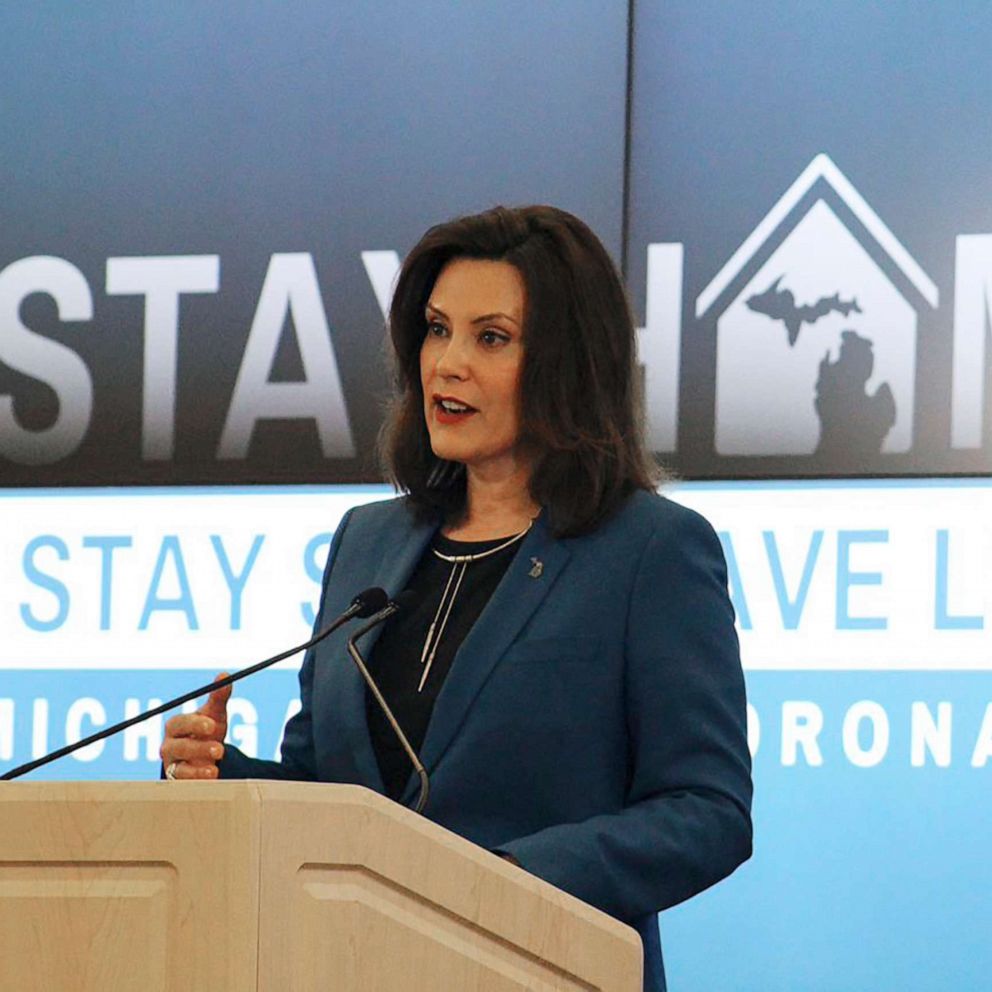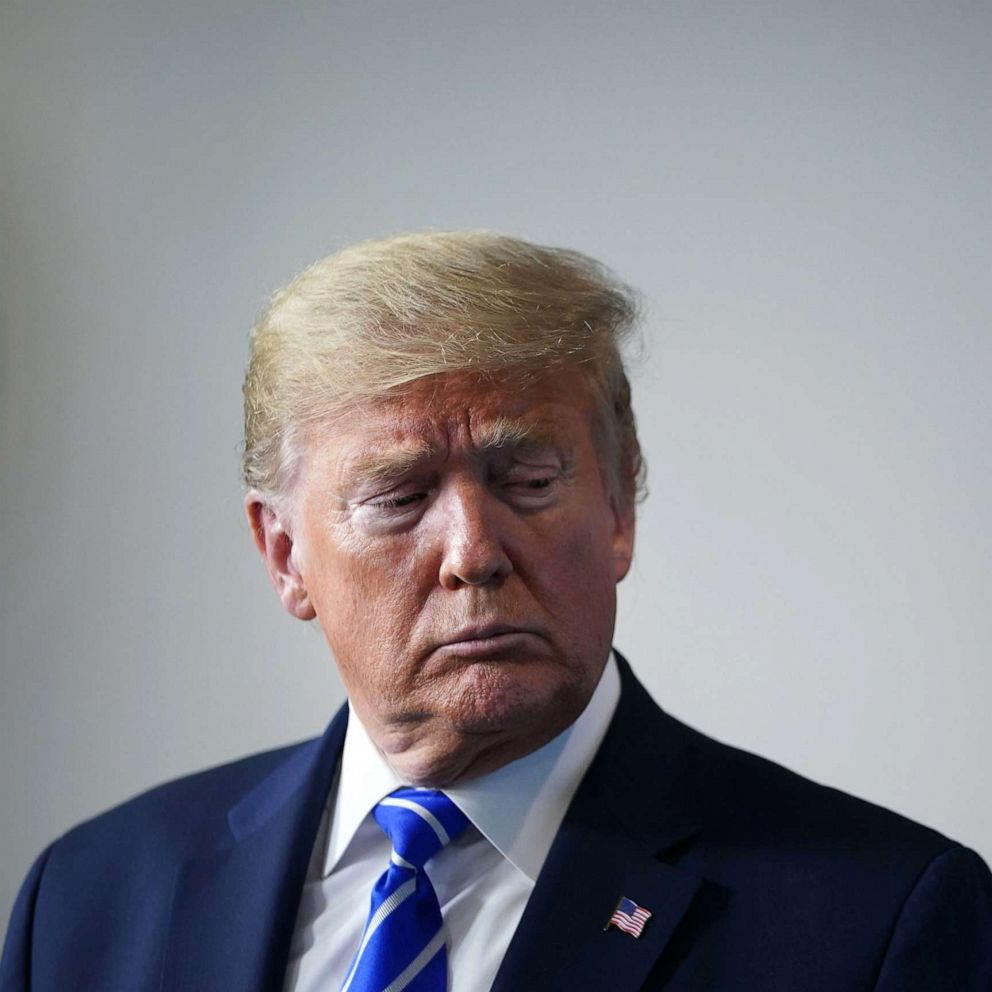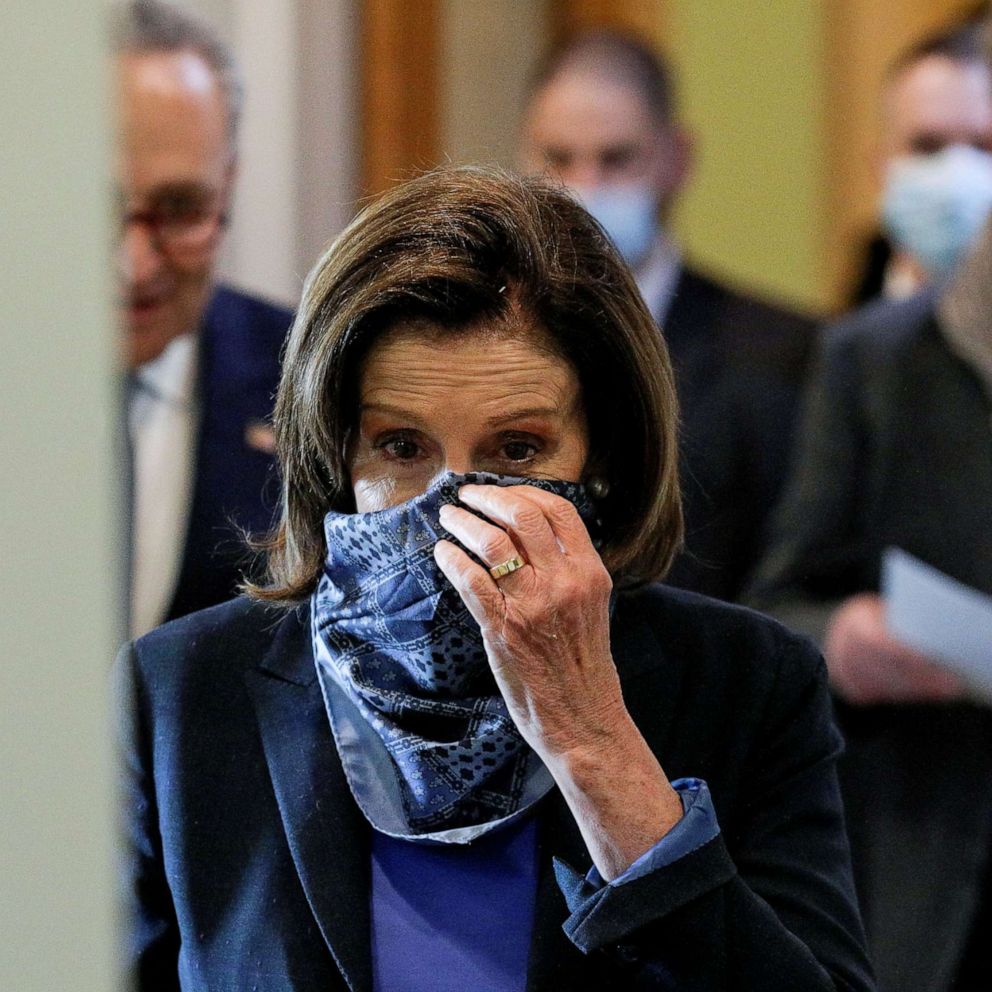Senate's return sets stage for showdown over coronavirus relief package
Partisan politics are likely to dominate the next round of negotiations.
Senators have not been in the Capitol in full force since March 26, but when they make their return Monday evening, lawmakers will be facing a full slate of coronavirus-related priorities.
Unlike previous legislative pushes during the pandemic -- remarkable for the rare shows of bipartisanship and speed -- the battle over the next phase of coronavirus aid is already marked by political acrimony, which is sure to slow legislative action.
Senate Majority Leader Mitch McConnell and Minority Leader Chuck Schumer both agree that a fourth piece of legislation is needed to address the enveloping health and economic crises, but that is about as much common ground as the two leaders appear to have found so far.
McConnell, R-Ky., has emphasized the need for a "targeted response" which addresses holes and shortcomings in previous coronavirus legislation, particularly once lawmakers have had a chance to see how that funding has been dispersed and put to work. But he’s drawn a "red line," demanding that the next bill include liability protections for health care workers and businesses.
Tune into ABC at 1 p.m. ET and ABC News Live at 4 p.m. ET every weekday for special coverage of the novel coronavirus with the full ABC News team, including the latest news, context and analysis.
"We cannot let a second pandemic of opportunistic litigation enrich trial lawyers at the expense of Main Street and medical professionals," McConnell and House Minority Leader Kevin McCarthy said in a joint statement Friday. "Senate and House Republicans agree these protections will be absolutely essential to future discussions surrounding recovery legislation."
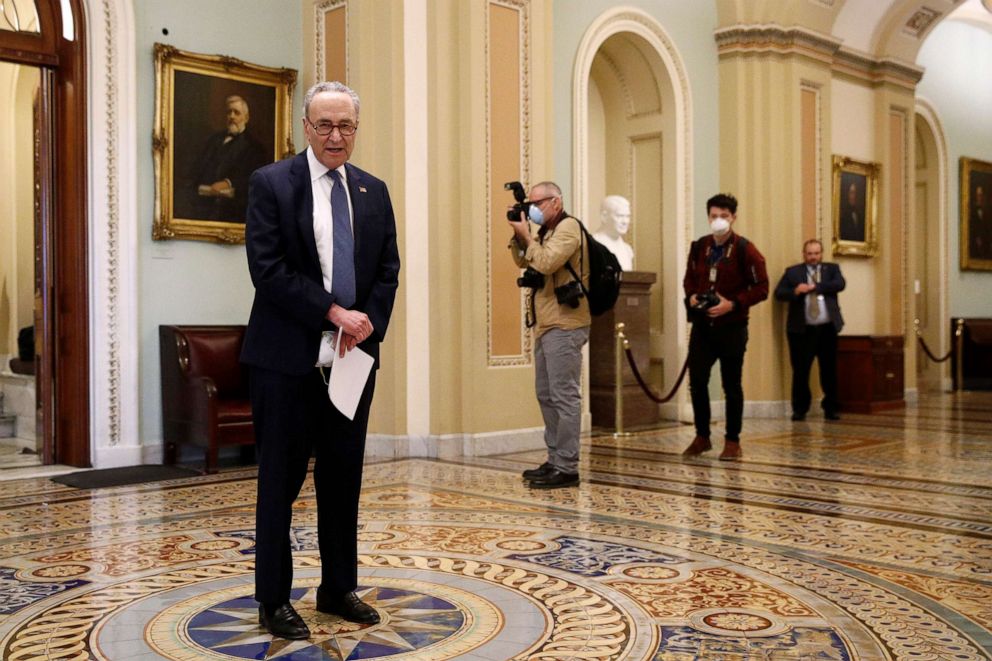
But so far, Democrats have signaled that these protections are a non-starter.
Speaker of the House Nancy Pelosi said Wednesday she would "not be inclined" to support liability protections. And last week, Schumer, D-N.Y., said that while he had not yet seen McConnell’s full proposal, he had serious concerns.
"Is he saying that if an owner tells a worker they have to work next to somebody who might have coronavirus without a mask or PPE that that owner wouldn't be liable? That makes no sense," Schumer said on a call with reporters.
Democrats and Republicans have already been squabbling over whether or not to send additional funding to state and locals governments hit hard by the economic fallout from the pandemic. Democrats have proposed more than $500 billion in such aid with Pelosi recently suggesting around $1 trillion.
McConnell ignited a fierce backlash when he said in a radio interview that cash-strapped states should be allowed to file for bankruptcy, saying he -- and his conference -- were unwilling to send federal taxpayer dollars to states who had spent "irresponsibly" in the past, like on state-run pensions that are deeply in debt. But his home state of Kentucky is one such state deep in red ink.
"My guess is their first choice would be for the federal government to borrow money from future generations to send it down to them now so they don't have to do that. That's not something I'm going to be in favor of," McConnell told radio host Hugh Hewitt.
Soon after, McConnell made clear he was "open" to adding funds to the next relief package, though the GOP leader could have to contend with President Donald Trump, who has recently stated that he doesn’t support the aid despite initially saying he would.
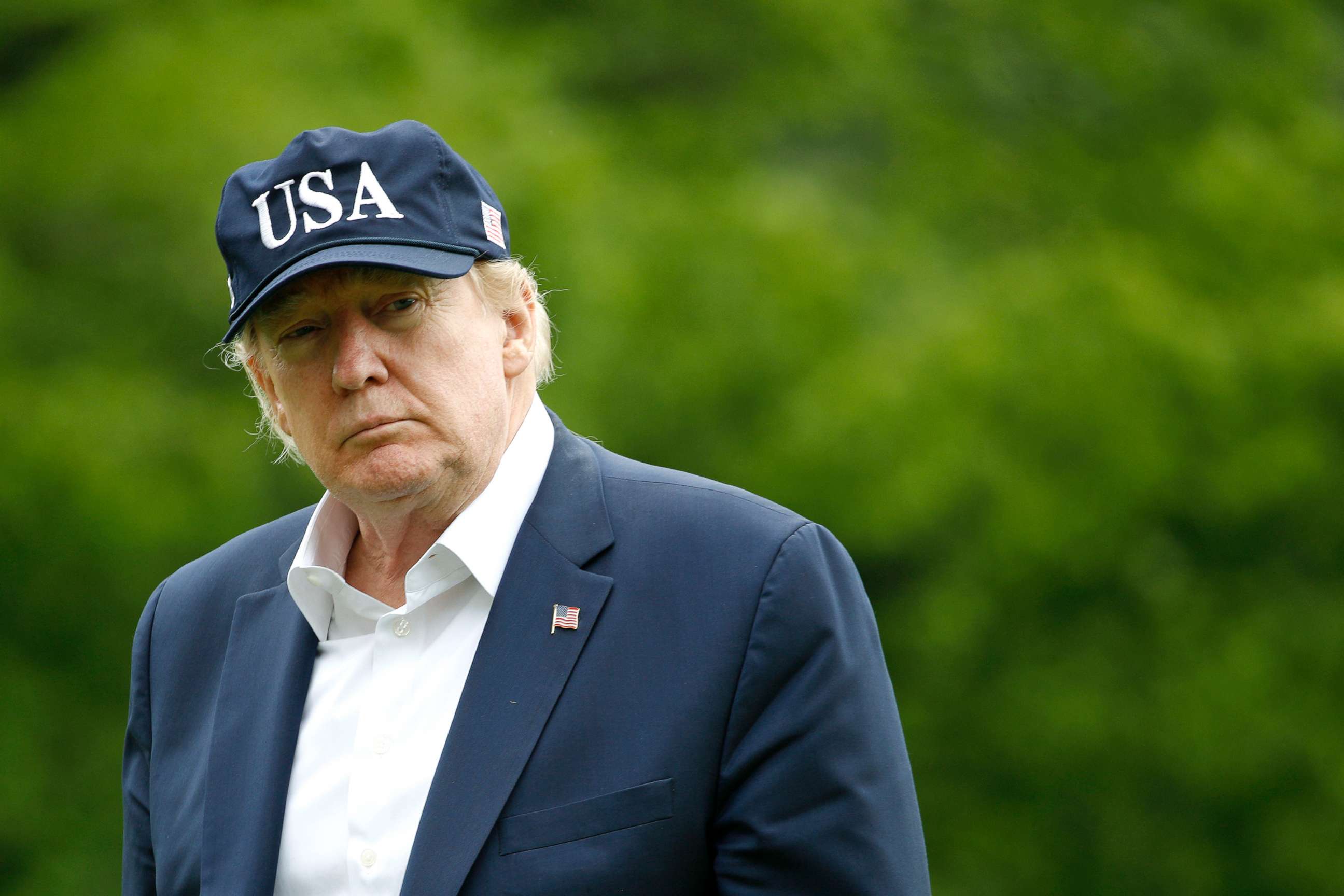
Rank-and-file lawmakers have introduced a flurry of proposals, including another round of the popular $1,200 stimulus checks and more money to dramatically increase the nation’s testing and contact tracing.
Lawmakers could provide more funding to the popular $660 billion Paycheck Protection Program, which had to be replenished a week ago after hard-hit small businesses exhausted the initial $349 billion for forgivable loans designed to keep employees on payroll. But PPP could undergo legislative changes, as well, as lawmakers have suggested tweaking the program to work for industries, like restaurants, that are desperate for more flexible terms under which those loans could be forgiven by lenders, according to aides close to the matter.
Republicans also want to make changes to the enhanced unemployment benefits created under the initial CARES Act stimulus bill, which boosted weekly pay by an additional $600 for recipients to help the many workers who lost their jobs as businesses shuttered in the coronavirus’ wake. GOP senators, led by Rick Scott of Florida, Ben Sasse of Nebraska and Tim Scott of South Carolina, said the extra pay created an incentive not to seek employment as the additional $600 was more than some made prior to the pandemic.
Small business owners have said as much in interviews and on Twitter.
John and Kathy Huddleston, owners of Badger’s Island Pizza in Kittery, Maine, are down to a skeleton staff with reduced hours, but they are short two delivery drivers and having trouble filling those jobs.
They have two full-time delivery driver jobs open right now.
John Huddleston told ABC News, "I can't tell you why they're not jumping at it now, other than the fact they’re still probably comfortable, maybe receiving compensation or unemployment. … It’s just hard to say. But we don't have anybody knocking our door down. We posted on Facebook, and it reached about 8,000 people and we got three responses. And they were not qualified."
Emmett Soldati, owner of Teatotaller, a Somersworth, New Hampshire, cafe, tweeted about his PPP loan‘s requirement that he rehire his staff at pre-pandemic levels.
"Of course, I'd be happy to get creative. Whether painting, or website work, or composing mix tapes for our drag shows, I was well prepared to fill the docket. There was only one snag. Everyone on unemployment (including me) will be receiving $600 extra per week from the feds," he wrote.
Lawmakers on both sides of the aisle have said they are seeking additional money for rural hospitals, extension of work authorization for Deferred Action for Childhood Arrivals recipients, funding for the postal service and much more.
But in addition to navigating the field of wide-ranging proposals for a potential fourth coronavirus relief bill, members are also contending with Congress’ responsibility to oversee the use of the combined $2.7 trillion in aid that’s already been approved.
One of the Senate’s first priorities upon its return will be to consider Trump’s nomination of Brian Miller to serve as the special inspector general to supervise the pandemic recovery work at the Treasury Department. Miller, who most recently served in the White House Counsel Office, has a confirmation hearing before the Banking Committee on Tuesday.
Democrats signaled early opposition to the Trump pick.
"This oversight position, which will be responsible for overseeing hundreds of billions of taxpayer dollars, requires complete independence from the president and any other interested party to assure the American people that all decisions are made without fear or favor," Schumer said in a statement. "To nominate a member of the president’s own staff is exactly the wrong type of person to choose for this position."
Lawmakers’ return to the nation’s capital, which is still under a stay-at-home order through mid-May and has yet to see its infection and death rates decrease, has sparked concern. But McConnell said it was time for the Senate to return to its work, citing the ability of essential workers to continue safely arriving at their posts each day.
"All across our nation, American workers in essential sectors are following expert advice and taking new precautions while they continue reporting for duty and performing irreplaceable work their country needs," McConnell said in a statement Friday. "Starting Monday, the Senate will do the same. There is critical business waiting for us, including continued action on COVID-19 but also urgent national-security legislation and nominations for key government positions."
Schumer said Thursday he was not informed before McConnell announced his decision to reconvene the Senate.
"He didn’t consult with me," Schumer said on a call with reporters. "I don’t even know if he consulted with medical experts."
The Office of the Attending Physician released guidelines to Senate offices on Friday, which were obtained by ABC news, outlining procedures put in place to protect the health of members and other employees on campus. The physician advised that masks or other face coverings be worn, though it is not required.
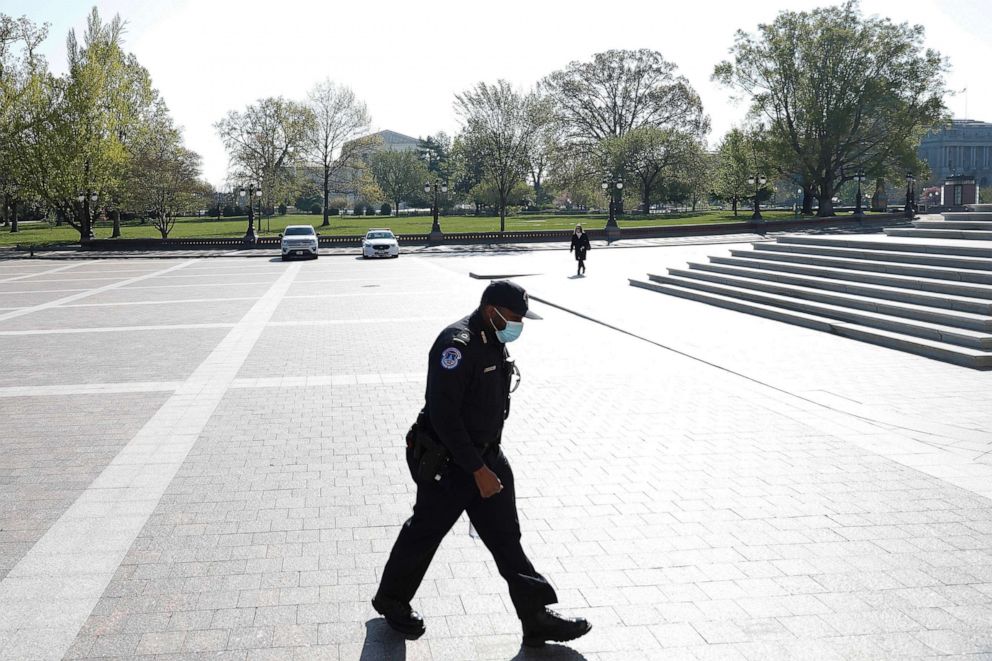
Employees working in the Capitol complex will also be required to participate in a health monitoring program that includes taking their temperature at home and completing an online self-assessment each day before reporting to work.
"If the employee responds "yes" to any question on the Health Screening inventory, the employee will be required to avoid the workplace setting and directed to consult with their health care provider," the guidelines read. "The employee should not come to the workplace."
It is unclear if senators will be required to participate in the program.
Dr. Lynn Goldman, dean of the Milken Institute School of Public Health at George Washington University, told ABC News it "probably doesn’t make sense" for any operation, including legislative business at the Capitol, to resume in D.C. right now.
"The epidemic is still growing," Goldman said. "We’re not yet at a point where we’re starting to see that downward trend that we want to see before we start to re-open businesses in various operations in any city.
Leadership on the House side is taking an even more cautious approach. After hearing from the House physician last week, House leaders, who had initially intended to convene the House on Monday, changed course.
"The House doctor, when I talked to him yesterday, was concerned because the numbers in the District of Columbia are going up," House Majority Leader Steny Hoyer said Tuesday. "The House physician’s view was the risk to members was not one he would recommend taking."
Some members had expressed concerns for their safety if they returned. Those concerns were shared by the many essential workers who will also need to return to Capitol grounds when the Senators do.
That includes construction workers, some food service and sanitation workers, and Capitol police.
According to Gus Papathanasiou, the head of the capitol police union, 12 capitol police officers have tested positive for COVID-19 since the start of the outbreak. Goldman said many other workers and Senators are also at increased risk by returning.
"D.C. hasn’t quite hit its peak in terms of numbers of cases per day, and so I do not think it is a wise move because, when Congress comes back into town, then many other people also need to come back into down," Goldman said. "It will necessitate far more essential activity."
"If one creates an area where there is transmission, including the Congress itself, that isn’t good for the health of the people who live in the District of Columbia," Goldman continued. "But it’s also not good for the country. We need those people to be healthy so that they’re making good decisions to guide our country at this very critical moment in our history."
What to know about the coronavirus:
- How it started and how to protect yourself: Coronavirus explained
- What to do if you have symptoms: Coronavirus symptoms
- Tracking the spread in the U.S. and worldwide: Coronavirus map
